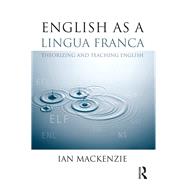- ISBN: 9780415809900 | 0415809908
- Cover: Hardcover
- Copyright: 9/2/2013
Challenging some of the dominant paradigms in the field, English as a Lingua Franca: Theorizing and teaching Englishargues for the importance of both native and non-native speakers in the future of English. Putting the case for a more nuanced and balanced approach to English as a lingua franca (ELF), Mackenzie: considers the advantages and disadvantages of learning and using ELF, contrasting positive views of linguistic multicompetence and crosslinguistic interaction with accounts of deficiency and interlanguage analyses ELF within the context of classroom teaching and learning, multilingualism and translation examines both the linguistic elements (lexicogrammar, phraseology, phonology, pragmatics, etc) and the sociolinguistic factors (accent, identity, uses) of ELF investigates the implications of ELF for translation, interpretation and publishing in a global market where non-native speakers of English greatly outnumber native speakers explores the importance of intercultural communication and cultural awareness in ELF, discussing the teaching of linguistic awareness, discourse strategies and various pragmatic aspects of ELF such as co-operation and accommodation highlights the advantages of understanding and being able to use more than one variety of English in the world today This is essential reading for everyone interested in English as a Lingua Franca, World Englishes and Multilingualism, as well as being a useful guide for teachers and translators dealing with the challenges posed by the rise of ELF.






